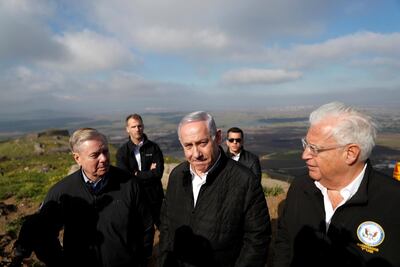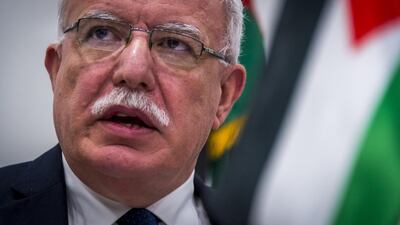Palestinians have called the US envoy to Israel "an ambassador of settlements" and threatened to file a suit against him at the International Criminal Court.
David Friedman, who financially and politically backed the illegal Israeli settlements before he was appointed ambassador, had told The New York Times that Israel had the right to annex part of the occupied West Bank.
"Under certain circumstances, I think Israel has the right to retain some, but unlikely all, of the West Bank," Mr Friedman told the Times.
In response, a spokesman for the Palestinian Authority dismissed the premise of US President Donald Trump's peace deal led by Mr Friedman along with Mr Trumps advisers Jason Greenblatt and Jared Kushner.
“The foreign policy of the superpower is dominated by a group of hardcore extremists like Kushner, Greenblatt and Friedman, who are not yet politically mature," Ibrahim Melham said on Saturday.
The authority announced on Sunday that it was considering filing a complaint to the ICC over Mr Friedman's remarks, because annexation is against international law.
Palestinian Foreign Minister Riyad Al Maliki on Sunday called Mr Friedman "illiterate in politics, history and geography", the Palestinian news agency Wafa reported.
“In what logic does Friedman think that Israel has the right to annex parts of the West Bank?” Mr Al Maliki asked,
“On what reality did he base his conviction? On international law prohibiting the annexation of territory by force? Or the reality imposed by the occupation authorities?”

Israel has not presented an annexation plan to the US and no such project is bring discussed, a US official told Reuters.
In March, the US State Department stopped referring to the West Bank as “occupied” in its annual human rights report.
French Foreign Minister Jean-Yves Le Drian, meanwhile, said on Saturday that Mr Trump's peace plan was "an approach that cannot grant serenity".
Mr Le Drian was speaking in Morocco, which has said it will not take an official stance on the long-awaited US proposal until it is fully revealed.
On Sunday, after a meeting of the Jordanian and German foreign ministers in Amman, both countries repeated that a "two-state solution through negotiations is the only solution".
The US is convening an economy-focused conference called the "Peace and Prosperity Workshop" in Manama, Bahrain at the end of the month.
Mr Kushner has described it as the fist step of the "deal of the century" to end the Palestinian-Israeli conflict.
US officials hope to raise at least $50 billion (Dh183bn) from donors, to be spent on development projects for Palestinians, and aid to neighbouring Arab countries.
Mr Trump's team has said they will tackle improving the Palestinian economy first and then the sticky questions of sovereignty, borders and rights.
The Palestinian leadership has widely condemned the conference as biased in Israel's favour after the US cut aid to Palestinians, moved the American embassy to Jerusalem, recognised Israel's annexation of the Golan Heights, and closed the Palestine Liberation Organisation's office in Washington.
All major Palestinian businessmen invited have rejected the invitation and called for a boycott of the event.
The PA, while widely unpopular at home, has captured the Palestinian public's widespread resentment of America's policies.
Last week Mr Kushner met with counterparts in the region to try to garner support for the conference.
So far, Saudi Arabia, Bahrain, Qatar and the UAE have all said they will take part. Jordan, like Morocco, has not yet announced a position.

